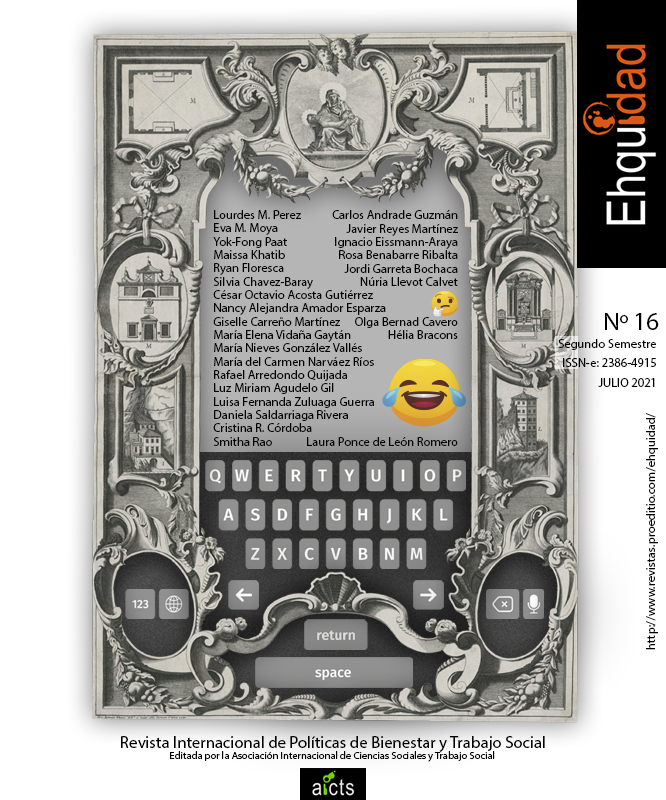On line distance learning in higher education during COVID-19 pandemic. Reflections on social work
DOI:
https://doi.org/10.15257/ehquidad.2021.0021Keywords:
Online Distance Learning, COVID-19, Higher Education, Social Work, Social InclusionAbstract
This article aims to analyze the contributions of on line distance learning in higher education during COVID-19 disease confinement. We compare experiences in the social work area of two universities, one face-to-face and the other virtual. Outcomes of meeting sessions explain competences, aptitudes, skills and behaviors between teachers and students to enhance the transmission of knowledge in this context. Main conclusions of this interaction between universities are related to benefits of the use of new technologies, ethical questions in exams, practices in Social Work and the verification of the digital divide as an element of social exclusion.
Downloads
References
Al-Okaily, Manaf ; Alqudah, Hamza; Matar, Ali ; Lutfi, Abdalwali ; and Taamneh, Abdallah. (2020). Dataset on the acceptance of e-learning system among universities student´s under the Covid-19 pandemic conditions. Data in Brief, 32, 106176. Doi. 10.1016/j.dib.2020.106176
Alqahtani, AmmarY., and Rajkhan, Albraa A., (2020). E-learning critical success factors during the Covid-19 pandemic: A comprehensive analysis of e-learning managerial perspective. Education Sciences, 10(9), 1-16. Doi; 10.3390/educsci10090216.
Baker, Carl., et al. (1996). Support for Open Learners: Reader. The Open University: Milton Keynes.
Bracons, Helia. (2017a). “Empatia e relação no Serviço Social: que desafios para a profissão?”. Revista Intervenção Social 49/50. Lisboa. ISSN 0874-1611, 135-144.
Bracons, Helia. (2017b). "Supervisão pedagógica na formação académica: conceções dos estudantes de Serviço Social". Revista Fluxos e Riscos vol. II nº 2. Lisboa. ISSN 1647-6131, 125-141.
Cabrera, Leopoldo (2020). Efectos del coronavirus en el sistema de enseñanza: aumenta la desigualdad de oportunidades educativas en España. RASE, 13(2), 114-139. doi: 10.7203/RASE.13.2.17125
Chang, Chiu Lan., and Fang, Ming (2020). E-learning and on line instructions of higher education during the 2019 novel coronavirus didesases (COVID-19) epidemic. Journal of Physics: Conference Series, 1574, 012166. doi: 10.1088/1742-6596/1574/1/012166.
Costa, Inés. (2016). Metodologias do ensino à distância. Salvador: Universidade Federal da Bahia.
Diniz, Teresa. (1992). Universidad Abierta/Educación a Distancia: una alternativa de Educación Superior. Estudios de Educación a Distancia, 16. Madrid: UNED.
Federación Internacional de Trabajadores Sociales (FITS). (2020). Definición global de la profesión de Trabajo Social. Federación Internacional de trabajadors sociales. Fecha de consulta 4 de octubre de 2020 disponible en https://www.ifsw.org.
Fernández, Tomás y Ponce de León, Laura. (2019). Trabajo Social con familias. Madrid: Alianza.
García Aretio, Lorenzo. (2001). La educación a distancia. De la teoría a la práctica. Barcelona: Ariel.
Kleij, Fabienne. (2015). “Effects of feedback in a computer-based learning environment on students' learning outcome. A meta-analysis”. Review of Education Research, vol. LXXXV, nº4.
Nariman, Dahlan. (2020). Impact of the interactive e-learning instruccions on effectiveness of a programming course. Advences in intelligent Systems and Computing, 1194, 588-597. doi: 10.1007/978-3-030-50454-0_61.
Nunes, Ivonio Barros. (1994). Noções de educação a distância. http://pt.scribd.com/doc/21015548/Artigo-1994-Nocoes-de-Educacao-a-distancia-Ivonio-Barros-NUNES, consultado a 2 de abril de 2020.
Silva, Antonio. (2004). Educação a distância e o seu grande desafio: o aluno como sujeito de sua própria aprendizagem. http://www.abed.org.br/congresso2004/por/htm/012-TC-A2.htm, consultado a 2 de abril de 2020.
Torun, Emel Dikbas. (2020). On line Distance in Higher Education: E-learning as a predictor of academic achievement. Open Praxis, 12(2), 191-208. doi: 10.5944/openpraxis.12.2.1092
Universidad Nacional de Educación a Distancia. UNED. (2020). Apliación EvEX. Disponible el 4 de octubre en el enlace https://blogs.uned.es/avex/.










